Solutions
Semiconductor
Turnkey chip design from RTL2GDSII
Turnkey Execution from RTL2GDSII
Wafer Space is focused on providing high end services and true value to its customers. Wafer Space achieves this with its turnkey engineering capability. Wafer Space can take any specification or an existing design and execute the complete RTL Design, Integration, Verification, STA-Synthesis, Physical design and DFT and tapeout a design. To achieve this capability Wafer Space has its own flows and processes, Project Management team, an expert senior core team, one of the best engineering teams and experience in taping out multiple designs.
System on Chip (SOC) Expertise
Wafer Space is one of the few companies with the expertise to be able to tapeout a complete SOC (System on Chip). Wafer can take an SOC, design, plan and execute the RTL integration, IP and SOC verification, STA and Synthesis, Physical Design and DFT. A team of senior technical experts in all the areas from RTL2GDSII an expert engineering team and well proven internal flows enables Wafer Space to achieve this.
Projects
Verification of AMBA Peripheral Designs
Wafer Space was responsible for the turnkey verification of a set of IPs based on the AMBA bus technology. Each of these designs were highly configurable in terms of application interface used (AXI/AHB/APB), number of master/slave ports and interrupts supported. The goal of verification is to qualify these designs for a set of random/directed design configuration’s. These designs were with customer specific memories and application interfaces
- Managed the entire DV flow from env and test planning to coverage closure
- Designed a configurable environment architecture - enables users to plug-in any AMBA configuration
- SV-UVM based environment and methodology with a set of reusable packet translators and scoreboards
Full Chip Physical Implementation and Closure
Wafer Space owned the entire breadth of Physical Implementation tasks from RTL2GDS II. This was a design targeted for the IoT space and integrated dual WiFi/BT radios, MAC and Baseband along with ARM Cortex R4 (240MHz). Implementation was in 40LP process node, the architecture also contained peripherals of the likes of SDIO 3.0+ power management, USB2.0, SPI/UART. Smart RF Integration and stringent power/area management requirements demanded skills above the ordinary!
- Hierarchical Implementation with 12 Partitions
- Constraint ownership and Development
- STA and timing closure on multiple modes/corners
- Power collapsible blocks (Power Gates, UPF)
- Cross-talk immune bus routing and optimization strategies
DFT for Full Chip SOC
Wafer Space was responsible for the full chip DFT from DFT Architecture to Silicon bring-up/ATE debug of an SOC for a major semiconductor company. This was a WLAN+BT device which was used for IOT.
- DFT architecture and implementation, ATPG and DFT verification, silicon bringup and debug and production support
- DFT Architecture was based on Low Test Power and least Test time, least verification time and maximum test coverage
- DFT implementation had LBIST, MBIST, BSCAN, Test Pin Muxing, Hybrid EDT, IO-Wrapper and used a hierarchical approach
- Silicon bringup and debug completed on ATE
Analog and Mixed Signal Layout Design
Wafer Space was responsible for the layout design of a complex LDO IP for a major Semiconductor company. The IP had analog modules, different power domains and 7 different flavours of LDO’s which were powering up different sections in the SoC. The challenges here included complex multi-power planning, individual floorplanning for each LDO and integration.
- Multi Power Mesh for three different power domains
- Optimization of design was needed to plan different LDOs according to PADs location and plan signal flow with respect to that
Verification of Performance Critical Hardware Accelerators
Wafer Space was responsible for verification of several components of hardware accelerators for use in the ADAS market. The design is a customer specific ADAS architecture and has fully hardware implemented Optical flow and stereo depth algorithms. The challenge here was to understand the pipeline flow between the complex imaging algorithms and the performance aspects.
- Developed custom SV UVM based verification environments for each component
- Scalable architectures to support reuse at top level
- Support for real image based inputs and output viewing
Diverse Partition Ownership
Our differentiated and skilled engineering talent instil confidence in our clients to partner with Wafer Space on critical executions like “High Performance IPs” and “Pilot Programs in upcoming technology nodes”. Some of the challenges that our team has taken up include -
- Frequencies upto 1GHz
- Memory intensive (various flavours)
- Stretch frequencies and implement critical clocking schemes (RC Balanced) to validate hold padding
- Put in place reusable floorplan guidelines for memory packing
- Multiple Instantiated Modules embedded
- Early Library Analysis, handle frequent releases and carve out a stable implementation flow
- Clean up all issues associated with coloring, multi-row-height standard cell variants
- High Performance Register File Build
- Frequencies as high as 3.5GHz
- Custom flow definition and Implementation to push frequencies to the limits without compromising on Area and Power
- Performance upto 800MHz
- Critical H-tree Clock Implementations
- RC Balancing requirements on data buses
Verification of Complex DDR4 Controller
Wafer Space was responsible for the verification of a complex DDR controller that supports DDR3, DDR4 and LPDDR4 memories. The design has a third party IP that supports half and quarter memory widths and the delivered RTL has customer specific logic around the third party interfaces. The challenges in this project are the shorter ramp times and porting third party delivered tests.
- Found several bugs in the third party IP
- Created a highly configurable environment for different bus widths
Verification of EMMC Controller
Wafer Space was responsible for verification of an eMMC controller for a major semiconductor company. The controller supports the SD 4.1 specifications and has a third party IP wrapped up with customer specific logic. The challenges in the project are working multi-site and being able to reuse third party delivered tests and environment at the IP level.
- SV-UVM based environment that supports ported tests as well as custom tests
- Used Bugscope for RTL properties generation and analysis
Featured Project
TURNKEY RTL2GDSII FOR AN IOT SOC
Wafer Space owned the entire breadth of RTL2GDSII RTL/DV/DFT and PD tasks for a complete SOC. This was a design targeted for the IoT space with integrated dual band WiFi and BT radios, supporting 802.11 a/b/g/n/ac along with ARM Cortex R4 (240MHz). Implementation was in 40LP process node, the architecture also contained peripherals of the likes of SDIO 3.0 /PCIe / USB2.0/SPI/UART. Wafer Space was responsible for the Synthesis, STA, Verification, Physical Design and DFT. This project was done in turnkey mode and was led by Wafer Space leads.
- Hierarchical Implementation with 12 Partitions
- Constraint ownership and Development
- STA and timing closure on multiple modes/corners
- Power collapsible blocks (Power Gates, UPF)
- Cross-talk immune bus routing and optimization strategies
- Subsystem level verification of MAC and USB subsystem in UVM
- Full chip Functional verification and toggle coverage
- Formal for pinmux verification
- No timing and Timing GLS (Both Max and Min Corner)
- GLS simulations with CPF
- Paladium based verification support
- Boot Code/Firmware development support.
- Silicon Debug
- DFT Architecture on basis of Low Test Power and least Test time, least verification time and maximum test coverage.
- DFT implementation with LBIST, MBIST, BSCAN, Test Pin Muxing, Hybrid EDT, IO-Wrapper with Hierarchical approach.
- ATPG pattern generation and verification for both block level as well as top level.
- DFT Silicon bring-up and debug on ATE and bench
- Production support
Automotive
Expertise in AUTOSAR and ADAS to connected cars

ADAS, AUTOSAR and Connected Cars
Wafer Space’s automotive team is focused on driver safety, comfort systems and services around AUTOSAR, ADAS and connected cars.
The critical competencies for driver assistance systems (ADAS) include sensor interfacing, algorithm development, DSP and image processing and embedded software development. With a portfolio of skills that cover these adequately, the team at Wafer Space has been participating in development and testing of specific modules of Driver Assistance Systems.
With the majority of OEMs and Tier 1 suppliers moving towards AUTOSAR, there is an increased focus on development of AUTOSAR compliant software. With a team having platform expertise and thorough understanding of different layers of AUTOSAR, Wafer Space has the capability to provide services in the areas of Complex device drivers, diagnostics and application migration.
ADAS Based Automated and Connected Car Concept
"The ADAS Based connected-car concept is an R&D project developed by Wafer Space to demonstrate expertise in building connected cars. The model uses image processing and decision making algorithms to demonstrate automatic lane detection of the car, responding to various real-life scenarios such as traffic signals, zebra crossings, school zones, silent zones amongst others. This demonstrates a connected car which can take decisions and react appropriately.
In addition, the car also monitors a host of real-time parameters such as cabin temperature, air-quality, quality of ride, detection of other cars which are too close, harsh acceleration or braking and a host of other parameters. This data is collected by a cloud based application which analyzes the data and makes inferences. This concept can be effectively used for real-life solutions such as Smart Fleet Management, Passenger Safety and Comfort, Predictive Maintenance and host of other possible scenarios."
Projects

Testing and Validation of Driver Assistance (ADAS) Software
This project involved white box testing of functional components of driver assistance system. The objective was to improve the granularity of the testing and the overall code coverage.
- Functional understanding of various modules at code level and instrumentation
- Test code development, test execution and report of test results
- First level analysis of problems of test failures
- Overall test coverage improvement
- Environment: Windows/C/C++/Cantata
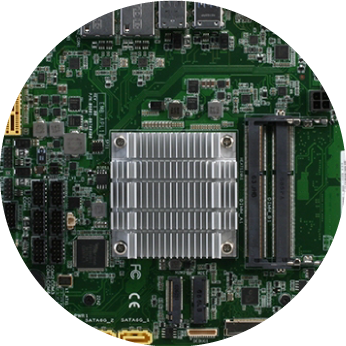
AUTOSAR ECU State Manager
The ECU State Manager module is a basic software Module that manages common aspects of ECU states in each of the automotive electronic sub-system. EcuM is part of the system services layer of AUTOSAR architecture.
- Development of ECU State Manager Module including Wakeup Feature Implementation, enabling Multicore Support
- Creating Test Framework to check EcuM Module Functionality.
- Handling the responsibility of EcuM module on COMMASSO (Platform to develop open source software based on AUTOSAR)
- Bug Fixing and enhancements
- Environment: AUTOSAR Workbench/Infineon Controller/Embedded C
Featured Project
HARRIS CORNER DETECTION ALGORITHM IMPLEMENTATION
This involved development of cross traffic alert algorithm on a DSP platform. The objective was to detect corners using Harris Corner detection method. This was meant to be used as part of an Automated Driver Assistance System (ADAS).
- Implementation involving gradient computation, Gaussian smoothing, Harris Measure computation, thresholding and non-maximum suppression
- Algorithm implementation and optimization
- Integration and testing on a DSP platform
- Validation on different cores for consistent functionality
- Testing on a live camera for real time performance and stability checks
- Development and testing on Windows/Linux environment using Vector tools and C, C++ and assembly programming
Industrial Control
Expertise in industrial product design and development
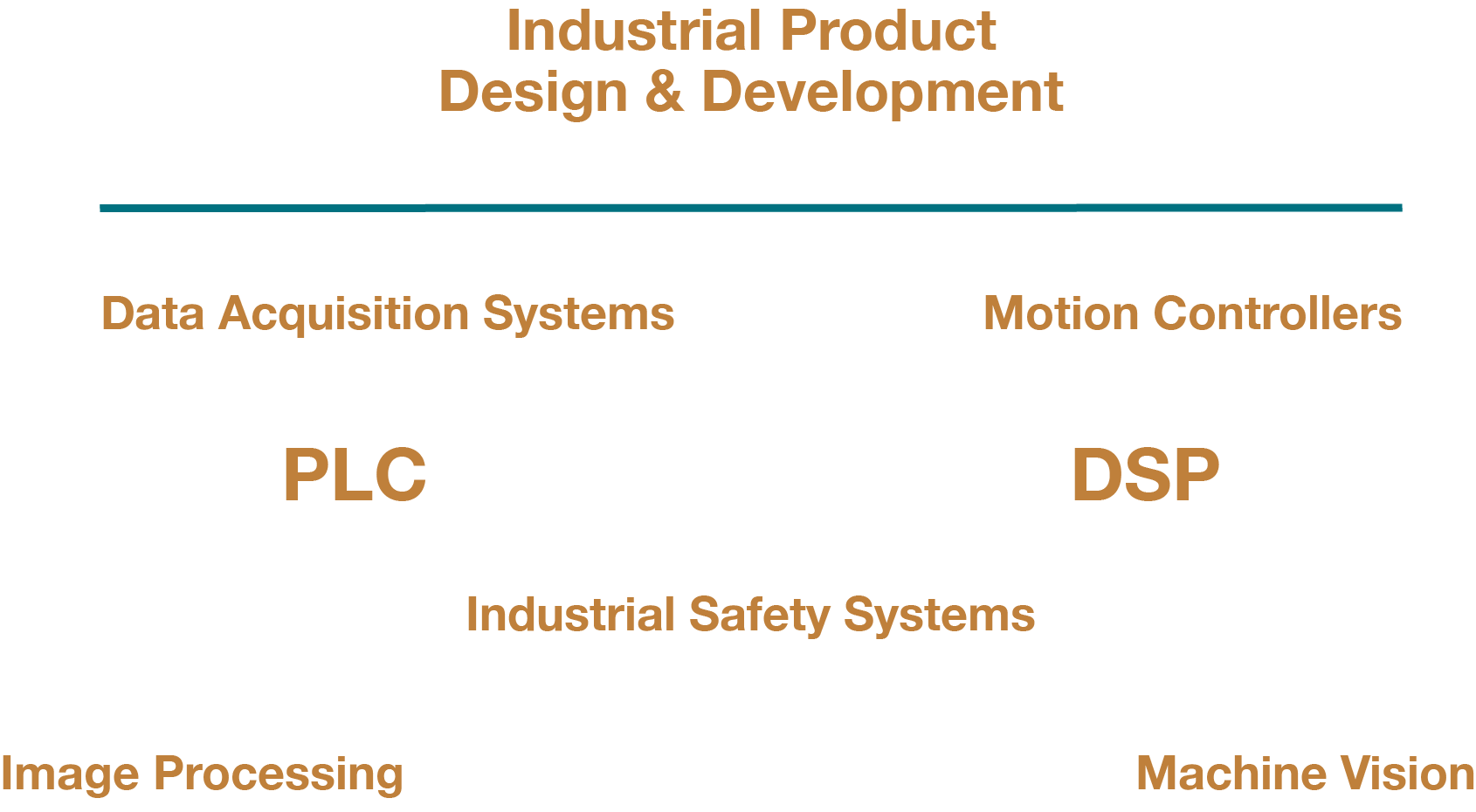
Embedded Product Design in Industrial Control
In Industrial Control, Wafer Space’s focus is on design and development of products for use in automation and control such as PLC, data acquisition systems, industrial safety systems, Motion controllers and others. Wafer Space has the expertise in hardware design, embedded software development and enclosure design, and can deliver complete products certified for operation under specific environmental conditions. Wafer Space can also leverage its expertise in horizontal technologies such as DSP, Image processing, Machine vision and others and can support implementation of solutions for end-of-line testing in manufacturing for validation and quality assurance.
PLC and Data Acquisition Systems
Irrespective of the size of an operation, programmable logic controllers are critical components in any Industrial Control system. With a combination of expertise in embedded technologies and Industrial Control domains, Wafer Space can provide engineering support for design and development of reliable PLCs and data acquisition systems. Familiarity with the quality standards for operation under extreme environment conditions has enabled Wafer Space to deliver products tested for compliance.
Projects
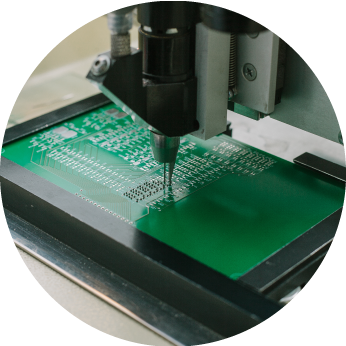
PLC Enabled for Industry 4.0
Programmable Logic Controller (PLC) has been traditionally used for Industrial automation and Control applications. With the advent of Industry 4.0, there is a need for PLCs which can support smart manufacturing through inbuilt connectivity, higher speed of performance and machine-to-machine connectivity. This project is aimed at developing a PLC with these features that can be easily integrated into a smart manufacturing environment.
- Hardware based on a multicore processor with capability for fast execution of complex algorithms
- Built-in support for multiple industrial communication protocols that enables M2M connectivity in a manufacturing environment with diverse set of equipment
- Design for secured communication that can allow connectivity with enterprise network with minimal vulnerability
- Comprehensive UI for configuration, device management, monitoring and reporting
- Scalability through multiple units for large manufacturing operations
Featured Project
DATA LOGGER FOR SMART PIG
This project involved development of a compact data logger for capturing various parameters within an oil and gas pipeline. The device works as part of a Smart Pipeline Inspection Gauge (Smart PIG) that moves along with the flow of fluid and records the data in a memory card.
- End-to-end development including hardware and software; participation from requirements analysis stage to delivery of functional prototypes
- Design and implementation of hardware based on ARM based processor, 12 Bit ADC, 48 channels, high speed USB, GPIO and BLE
- Implementation of embedded software including diagnostics, functional software and user interfaces
- Use of BLE for initialization and configuration
- Low power design and implementation of comprehensive power and battery management for long battery life
- Design for reliable performance under varying temperature and vibration environment
- Environmental testing of functional prototypes
Internet of things (IOT)
IOT Expertise from Sensors and Connectivity to Cloud Apps

Expertise from Sensors and Connectivity to Cloud Based Apps
Wafer Space is currently developing IOT solutions for multiple vertical markets. Wafer Space has expert knowledge in sensor interfacing, connectivity protocols, embedded software development and mobile application development. Wafer Space is developing solutions which address specific pain points across different vertical markets. Wafer Space’s knowledge in areas like sensor interfacing, connectivity protocols, embedded software development, mobile application development and others has enabled Wafer Space eto build some compelling solutions targeted for automotive and industrial control applications.
IOT Center of Excellence
Key functional components of any IOT based solution involves sensor interfacing, sensor data management, data analytics, connectivity and management application. Through several internal initiatives as part of IOT center of excellence, Wafer Space has acquired deep understanding of these areas and created proof-of-concepts of solutions to address specific industry problems. Wafer Space has invested in building a set of building blocks for handling common functionalities across domains which allows Wafer Space to quickly integrate and provide working solutions.
Projects

Enabling Predective Maintenance for Industrial Equipment
One of the challenges faced in the industry is to ensure that all the equipment necessary for manufacturing and environmental control such as HVAC (Heating, Ventilation and Air Conditioning) are maintained with minimal downtime. Traditional maintenance checks, apart from being tedious may not be highly accurate. The objective of this project is to enable all such equipment for predictive maintenance through automated alerts in the event of deteriorating performance.
- Use of IOT technology for tracking of various parameters
- Pro-active recognition of abnormalities in performance through checks for overheating, vibration, energy consumption
- Central dashboard for single view of a large manufacturing setup with multiple machines and equipment
- Mobile application for vendor maintained equipment under maintenance contract for faster turnaround times
Featured Project
SMART FLEET MANAGEMENT
A critical requirement in transportation sector is on sustaining customer satisfaction of passengers through ensuring safety as well as comfort. The definitions of passenger comfort varies from one geography to another, so is the safety. Irrespective of this, there is a commonality with respect to what is perceived as passenger comfort. This project is aimed at developing a system that can be used for tracking passenger safety and comfort that can be integrated into an existing fleet management system.
- Enabled for tracking critical parameters impacting passenger comfort and safety through a wide set of sensors
- Can track abnormal speeds, lane changes, close driving, signal jumps, etc. that adversely impact passenger comfort and safety
- Single, compact device that can be mounted on dashboard
- Enabled for cloud connectivity for data upload and remote monitoring
- Extensible for vehicle health tracking and maintenance
Value Engineering
Expertise in optimizing embedded products for cost and features.
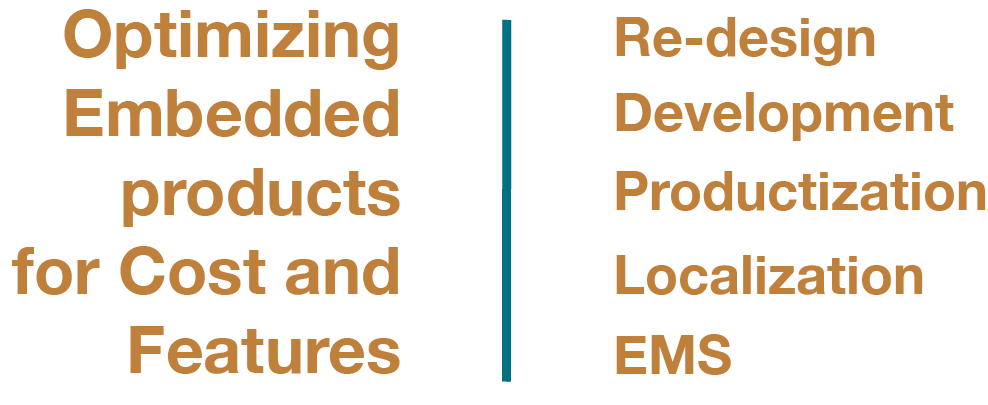
Value Engineering of Products
Considering that there is significant challenge in direct adoption of the same version of products across geographies, Wafer Space has invested in expertise acquisition that can enable re-design of products with insight into the user demography, operational environment, cost and feature expectations. Through this, Wafer Space can facilitate re-design and development, productization, localization of features for ease of use and others. Wafer Space has partnerships with EMS vendors to enable volume manufacturing of re-designed products to meet the target cost.
Framework for Value Engineering
A typical value engineering project involves achieving multiple objectives including cost reduction, feature optimization, improving maintenance, design for addressing obsolescence, improving manufacturability and testing, reducing variants and others. Wafer Space has defined a comprehensive framework that takes into consideration all the above aspects and can enable systematic value engineering with visible results in a compressed time frame.
Projects

Framework for Value Engineering
Typical value engineering project involves achieving multiple objectives including cost reduction, feature optimization, improving maintenance, design for addressing obsolescence, improving manufacturability and testing, reducing variants, etc. Defining a comprehensive framework that takes into consideration all the above aspects can enable systematic value engineering with visible results in a compressed time frame. This is represented in the diagram below
Featured Project
LOW COST ELEVATOR PANEL
Objective of this project was to redesign an existing elevator panel for achieving cost reduction and optimized features for deployment in developing markets where cost is a critical parameter for buying decision. The goal was to achieve 20% to 30% cost reduction with a redesigned panel. The framework defined for value engineering was applied as part of the execution.
- Comprehensive analysis of feature requirements for the markets to be addressed. Aligning product features with the desired features
- Cost reduction through alternative to high resolution display, touch panels, etc.
- Elimination of redundant components, replacement of expensive components with equivalent low cost alternatives
- Form factor optimization through improved layout
- Cost reduction through alternate sourcing
Software and Apps
Expertise in Software and APP Design.
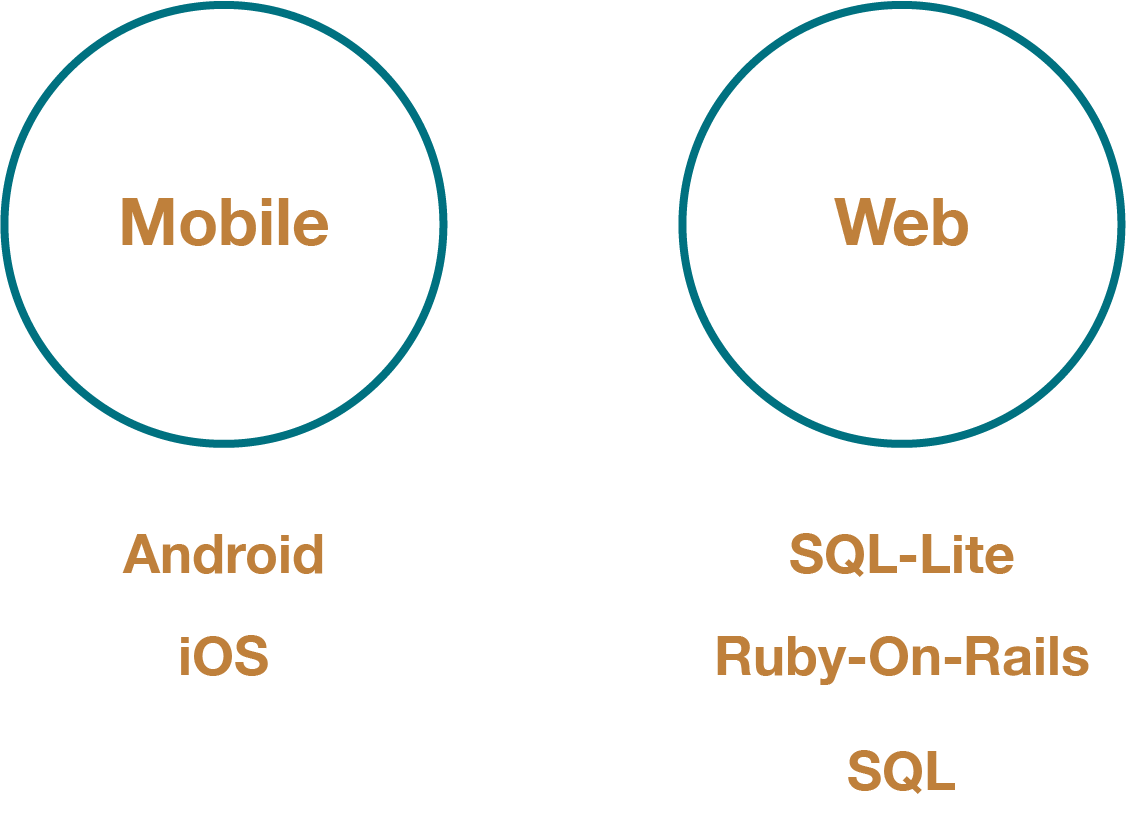
Software and APP Solutions
The Wafer Space Engineering Team has expertise in key application technology areas such as Core Java, Java Scripts, HTML-CSS, Ajax, Ruby-On-Rails, Junit, Android and iOS application development, Databases such as SQL, Hibernate, SQL-Lite and others. The Wafer Space team can take on any software project and deliver a custom solution.
Complete solutions from semiconductor and embedded to software and applications
Wafer Space’s combined expertise in Semiconductor and Embedded systems combined with its expertise in software and app development allows Wafer Space to provide a complete System solution to its customers.
Projects

eLearning Platform Development.
Wafer Space team contributed to the instruction based delivery of eLearning platform which uses latest software technologies such as Polymer, JavaScript, CSS, Html, XML & SCORM for frontend and Amazon AWS for storage.
- Ramp-Up and keep pace with the latest and ever-changing application technology environment.
- Ramp-up on Google Polymer® technology for design and development of the specific project requirements.
- Ramp-up on and deliver on technology specific to eLearning domains such as SCORM & XML.
- Adapt quickly for change-requests and deliver in a very short turn-around-time.
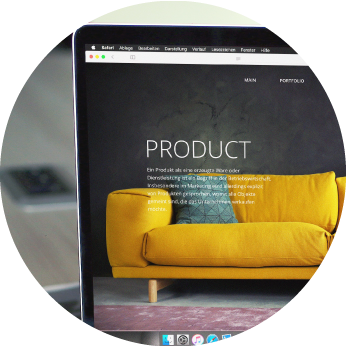
End-To-End eCommerce Solution
Wafer Space team contributed to the next-generation eCommerce solution being offered through a mobile app that enables retailers to offer a wide variety of products, services, apps and content to their customers, built with an exclusive product list at competitive prices, an exhaustive list of apps, dynamic daily content and easiest recharge and DTH services, all on a single platform.
- Team contributed to both FrontEnd using Angularjs and backend technologies using Ruby on Rails.
- Contribution to end-to-end development of key market-place features such as – Marketplace, Catalog Upload, Catalog Services, Shopping App, Consumer App etc.
- Key contribution to Quality and Validation process.
- Mobile Application development using Android to implement key features such as Firebase Cloud Messaging, Integration and Analytics, Touch Analytics and Push Notification, Fabrics Crash analytics monitoring and a host of other features.
Featured Project
DESIGN AND DEVELOPMENT OF CRM MODULE
Custom CRM development project involved study, feature analysis and feasibility of available open-source as well as commercial CRM software available in the market. The CRM module developed by Wafer Space involved addressing specific software requirements of the CRM software.
- The CRM module was implemented to meet the needs of specific requirements.
- The GUI interface was developed using Angular JS 1.5.1.
- Backend was developed using Core-Java, Java script, Boot-Strap and Moment JS.
Have a project to discuss?

Would you like to learn more about what we do? Do you have a project you would like to discuss? If so then please submit your response and we will contact you shortly.
You can also call us:
US: +1(408) 625 7195India: +91 80-46720000
